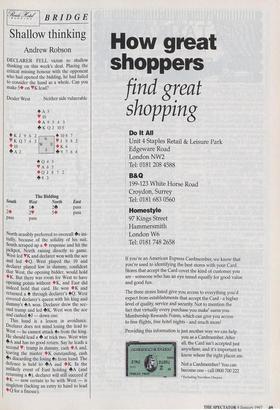BRIDGE
Shallow thinking
Andrew Robson
DECLARER FELL victim to shallow thinking on this week's deal. Placing the critical missing honour with the opponent who had opened the bidding, he had failed to consider the hand as a whole. Can you make 54 on •K lead?
Dealer West Neither side vulnerable
4 A 5
V 10
• A 9 5 4 3 4 K J 9 6 K Q 7 4 ♦ 10 • A 2 2 3 • K Q J 105 4 10 8 • J 9 • K 6 7 8 2 6 4 + 9 7
N
W E 4 Q 4 3 ♦ A 6 5
♦ Q J 8 7 2 8 3
The Bidding South West North East 14 2+ pass
24 2V 5♦ pass pass pass North sensibly preferred to overcall +s ini- tially, because of the solidity of his suit. South scraped up a ♦ response and hit the Jackpot, North raising directly to game. West led VK and declarer won with the ace and led ♦Q. West played the 10 and declarer played low in dummy, confident that West, the opening bidder, would hold VK. But there was room for West to have opening points without ♦K, and East did indeed hold that card. He won ♦K and returned a 4 through declarer's 4Q. West covered declarer's queen with his king and dummy's 4A won. Declarer drew the sec- ond trump and led 4K. West won the ace and cashed 4J — down one.
This hand is a lesson in avoidance. Declarer does not mind losing the lead to West — he cannot attack +s from the king. He should lead a at trick two. West wins +A and has no good return. Say he leads a second V: trump in dummy, cash •A and, leaving the master ♦K outstanding, cash +s discarding the losing 4s from hand. The defence is held to +A and •K. In the unlikely event of East holding +A (and returning a 4), declarer will still succeed if — now certain to be with West — is singleton (lacking an entry to hand to lead
• Q for a finesse).


























































 Previous page
Previous page